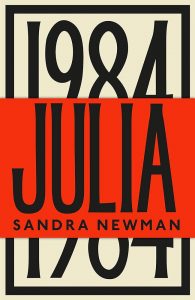 Sandra Newman’s Julia introduced many aspects to the story of 1984, but what really interested me the most was Part 3. Here we as the reader were thrust into the unknown, beyond the confines of the original story. Beyond having a conversation with Winston after she is released from The Ministry of Love, Julia is able to venture past the confines of Airstrip One. There she escapes the grasp of Big Brother and finds herself in the company of the Brotherhood. They marvel at her ability to survive torture and escape, and tell her of how they have taken over the Crystal Palace and captured Big Brother.
Sandra Newman’s Julia introduced many aspects to the story of 1984, but what really interested me the most was Part 3. Here we as the reader were thrust into the unknown, beyond the confines of the original story. Beyond having a conversation with Winston after she is released from The Ministry of Love, Julia is able to venture past the confines of Airstrip One. There she escapes the grasp of Big Brother and finds herself in the company of the Brotherhood. They marvel at her ability to survive torture and escape, and tell her of how they have taken over the Crystal Palace and captured Big Brother.
Julia is enamored with all that this group has to offer, however, she notices several things that bother her. Past all of the nicer clothes, special baths, and tasty wine, there are elements that feel very similar to life living under Big Brother. The Brotherhood’s treatment of their prisoners of war is no more humane that the treatment of those at the Ministry of Love:
“Most were boys, and some were no more than thirteen. All had the afflicted look of long malnourishment. Their postures were almost comically woebegone; they hung their heads and hugged themselves in misery” (Newman 479).
However, this is not the thing that causes Julia to panic. Instead, as she is giving her personal statements, she is shocked to hear the questions that O’Brien had mentioned:
“With a little shock, she realized what the questions were. It was the list of crimes O’Brien had said truth-followers would happily commit—the list he’d had Winston Smith agree to, when pretending to recruit him to the Brotherhood” (Newman 511).
Suddenly Julia, along with the audience, are doubtful of the Brotherhood, even though we are told that these questions should not be taken seriously. This is made even more apparent when Julia does not answer yes to one of the questions, and the person interviewing her becomes troubled with her response. Once again, she must resort to lying to survive:
“She didn’t have the freedom to think of what was right. She must do what was safe. It was as Ampleforth had said: one had no choice, one must only live through it as if one had” (Newman 513).
The society under Big Brother and the Brotherhood are two sides of the same coin: one only appears to be better than the other. Even though she had escaped to freedom, Julia is still not fully free to be open about her opinions or her actions. Newman’s Julia reminds us that no matter the intention, there is still potential for things to not be as they seem; there is an illusion of choice.